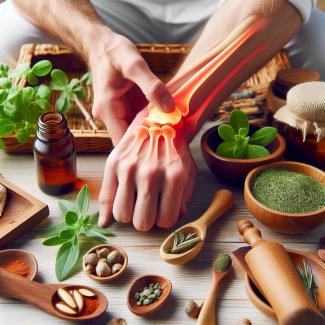
To effectively treat ankle or wrist pain, you can consider several approaches, including home remedies and herbal treatments:
Home Remedies and Methods:
- Rest and Ice: For acute pain and swelling, rest the affected ankle or wrist and apply ice packs wrapped in a cloth for about 15-20 minutes every few hours. This helps reduce inflammation.
- Compression: Use an elastic bandage to wrap the ankle or wrist snugly (but not too tight) to support the joint and reduce swelling.
- Elevation: Keep the ankle or wrist elevated above the level of your heart whenever possible to help reduce swelling and pain.
- Over-the-counter Pain Relievers: Non-steroidal anti-inflammatory drugs (NSAIDs) like ibuprofen or naproxen can help reduce pain and inflammation. Follow the dosage instructions carefully.
- Gentle Stretching and Strengthening Exercises: Once the acute pain subsides, gentle stretching and strengthening exercises can help improve flexibility and reduce stiffness in the joint. Avoid overexertion.
Use of Natural Plants and Herbs:
- Turmeric: Known for its anti-inflammatory properties, turmeric can be added to food or taken as a supplement. It contains curcumin, which helps reduce pain and inflammation.
- Ginger: Ginger also has anti-inflammatory effects and can be consumed as tea or added to meals to help alleviate joint pain.
- Epsom Salt Soak: Soaking the affected ankle or wrist in warm water with Epsom salt can help reduce pain and inflammation.
- Arnica: Arnica cream or gel, derived from the arnica plant, can be applied topically to reduce pain and bruising.
- Essential Oils: Certain essential oils like lavender, peppermint, or eucalyptus oil can be diluted with a carrier oil (such as coconut oil) and massaged into the painful joint to relieve discomfort.
Additional Tips:
- Proper Footwear and Support: Ensure you wear comfortable, supportive shoes or use wrist splints if needed to stabilize the joint and prevent further strain.
- Hot and Cold Therapy: Alternating between hot and cold packs can also help reduce pain and promote healing. Use a warm compress or heating pad for stiffness and cold packs for acute pain or swelling.
- Healthy Diet: Maintain a balanced diet rich in fruits, vegetables, lean proteins, and omega-3 fatty acids to support joint health and reduce inflammation.
- Avoid Repetitive Strain: If the pain is due to repetitive activities, modify your movements or take frequent breaks to rest the joint.
It's important to consult with a healthcare professional if you have persistent or severe pain in your ankles or wrists, especially if it interferes with daily activities or if there is swelling, redness, or warmth around the joint. They can provide a proper diagnosis and recommend the best treatment plan tailored to your specific condition.






